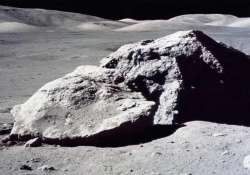New technique can reveal age of moon rocks
Washington: A new technique can successfully put a date on an Earth rock that is similar to the lunar rocks on the moon's surface, shows research.The results show that events from solar system history that

Washington: A new technique can successfully put a date on an Earth rock that is similar to the lunar rocks on the moon's surface, shows research.
The results show that events from solar system history that are recorded on much of the visible face of the Moon can one day be dated directly by instruments aboard a lunar lander.
"We can see cratered terrains on the Moon whose ages, we do not know within a billion years," said F. Scott Anderson from the department of astronomy at University of Washington.
Ages of lunar terrains are the linchpin for understanding the sequence of planetary-scale events from Mercury to Mars.
"So filling this gap in our understanding of the Moon will help us correct or re-write the history of volcanism, planetary evolution, water and life in the solar system," he said.
The new technique called laser ablation resonance ionization mass spectrometry successfully dated an Earth rock named the Duluth Gabbro that is analogous to the rocks that cover one-third of the lunar nearside.
"Dating the Duluth Gabbro was approximately 30 times more analytically challenging than our previous experiment, dating the Martian meteorite Zagami," said co-author Jonathan Levine.
"We are now continuing to analyse planetary samples of increasing complexity," he said in a paper appeared in the journal Wiley.
The researchers have proposed to NASA to send a dating mission to the Moon called "MARE: Moon Age and Regolith Explorer".